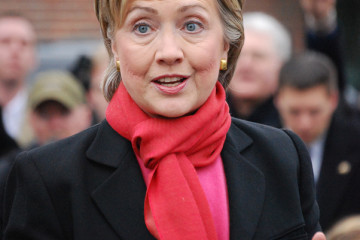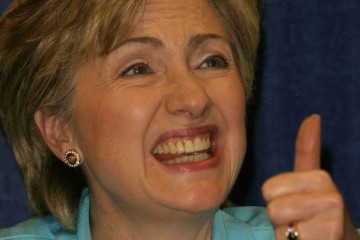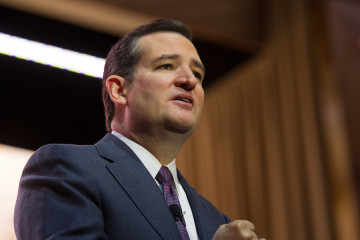In Debate, Clinton Says It’s Time to ‘Save Capitalism From Itself’

©2015 Bloomberg News
NW6RT86KLVRN
(Bloomberg) — The first Democratic presidential debate on Tuesday erupted into an argument over the nature of capitalism, with Senator Bernie Sanders doubling down on his critique of its excesses and front-runner Hillary Clinton declaring that it was time to “save capitalism from itself.”
Sanders said the 2016 presidential election is about “whether we can mobilize our people to take back our government from a handful of billionaires and said Americans will vote for a Democratic socialist—how he describes himself—if they understand what it means and that he is not part of the “casino capitalist process.”
Under pressure during the campaign from the left, Clinton offered a passionate defense of her record, saying she will “take a backseat to no one in terms of my progressive experience” but suggesting that she’s more of a political pragmatist than Sanders, a socialist who has turned into her toughest competitor. “I’m progressive but I’m a progressive who likes to get things done,” she said.
While the spotlight is on Clinton at the debate, it’s also an opportunity for her competitors to reset a field that she has dominated all year.
For Vermont Senator Bernie Sanders, the stage at the Wynn Las Vegas is an opportunity to test his appeal beyond the liberal base. Martin O’Malley, Jim Webb and Lincoln Chafee are trying to generate enough interest to push them beyond 1 percent or 2 percent support in the polls. And there will be attention on one politician who’s not on stage: Vice President Joe Biden, who has postponed a decision on whether to run as he grieves his son Beau’s death to brain cancer, will be watching from his residence in Washington.
The debate, hosted by CNN and Facebook, is almost certain to be more manageable than the two Republican debates that have been held so far, which have featured a field of candidates more than three times as large that had to be divided into two separate time-slots. Donald Trump, the reality TV star-turned- surprise Republican front-runner who has taken credit for the large audiences attracted to his party’s debates, is live- tweeting the Democratic event, even though he predicts it will be boring. In fairness to the Democrats, they’ve got tough competition for eyeballs: The debate will be up against a potentially decisive game four of the baseball playoff series between the New York Mets and the Los Angeles Dodgers. Even President Barack Obama may succumb to the temptation of the divisional matchup. “I would anticipate that he may be doing a little channel surfing,” White House Press Secretary Josh Earnest told reporter, adding: “But the president is certainly interested in the debate.”
There’s also a bit of a playoff atmosphere for Clinton, who was considered the prohibitive favorite when she formally launched her campaign six months ago, only to see her lead eroded by a controversy involving her use of a private email server while she was secretary of state, and by liberal Democrats’ embrace of Sanders as a populist critic of Wall Street and a proxy for Massachusetts Senator Elizabeth Warren, who declined to enter the presidential race.
Making her second run for the presidency, the former secretary of state, New York senator and first lady has sought in recent weeks to rebut criticism and ignite some enthusiasm for her candidacy with positions that appeal to her party’s liberal base. Clinton came out against the Trans-Pacific Partnership, a trade deal she had supported while in the administration but which draws opposition from unions and Sanders. She spoke out in opposition to the Keystone XL pipeline, which the Obama administration has been considering since Clinton’s tenure at the State Department. The proposed transcontinental pipeline is favored by Canada and many U.S. businesses and trade unions but opposed by environmentalists, including one top Democratic financier, Tom Steyer. Clinton also proposed new Wall Street reforms, while stopping short of a proposal advocated by Sanders and O’Malley to reinstate the Glass-Steagall Act. Her challengers and critics want to press her on these subjects as well as her involvement and stances on U.S. foreign policy including in Libya and Syria.
As top performer in polls, Clinton had the center spot on stage at the Wynn hotel and casino. She was flanked by Sanders, her closest challenger and former Maryland governor O’Malley, with former Virginia senator Webb and former Rhode Island governor Chafee on the wings. Sanders has also done some ideological tacking in the days leading up to the debate to bring his position on guns closer in line with that of his party’s mostly pro-gun control constituency.
Clinton began preparing for the debate in early August. Her mock sessions have been led by Ron Klain, a former Biden chief of staff who remains close to the vice president and who helped prepare President Barack Obama for general election debates against Mitt Romney in 2012. Washington attorney Bob Barnett, who is Clinton’s book lawyer and has been involved in Democratic presidential debate teams since 1976, played Sanders. Clinton policy adviser Jake Sullivan, a former Biden national security adviser, played O’Malley. Clinton did not prepare as intensively for Webb, Chafee or Biden.
The debate comes a little more than a week before another high-stakes, high-profile public appearance for Clinton. On Oct. 22, she is to appear before the House Select Committee on Benghazi, a Republican-led probe that has sought to scrutinize Clinton’s actions before and after the 2012 attacks by Islamic militants that killed for Americans in Libya. Clinton and her Democratic allies contend it’s an effort by the Republican- controlled Congress to embarrass her.
Clinton had led Democrats in fundraising this year. But in the third quarter, Sanders came much closer to Clinton than expected, raising $26 million to her $28 million according to figures that both candidates have made public. Third quarter campaign finance reports from all of the presidential campaigns are due at the Federal Election Commission on Thursday. In Iowa, where the first ballots of the 2016 contest will be cast in Feb. 1 caucuses, Clinton leads the Democratic field in Iowa by 6.3 percentage points, according to an average of recent polls in the first caucus state tracked by Real Clear Politics. Sanders leads the field in New Hampshire by 9.2 percentage points in the latest RCP average of polls from the first primary state.
To contact the authors of this story: Margaret Talev inWashington at mtalev@bloomberg.net Jennifer Epstein inNew York at jepstein32@bloomberg.net To contact the editors responsible for this story: Kathy Kiely at kkiely9@bloomberg.net Mike Nizza at mnizza3@bloomberg.net







No Comment